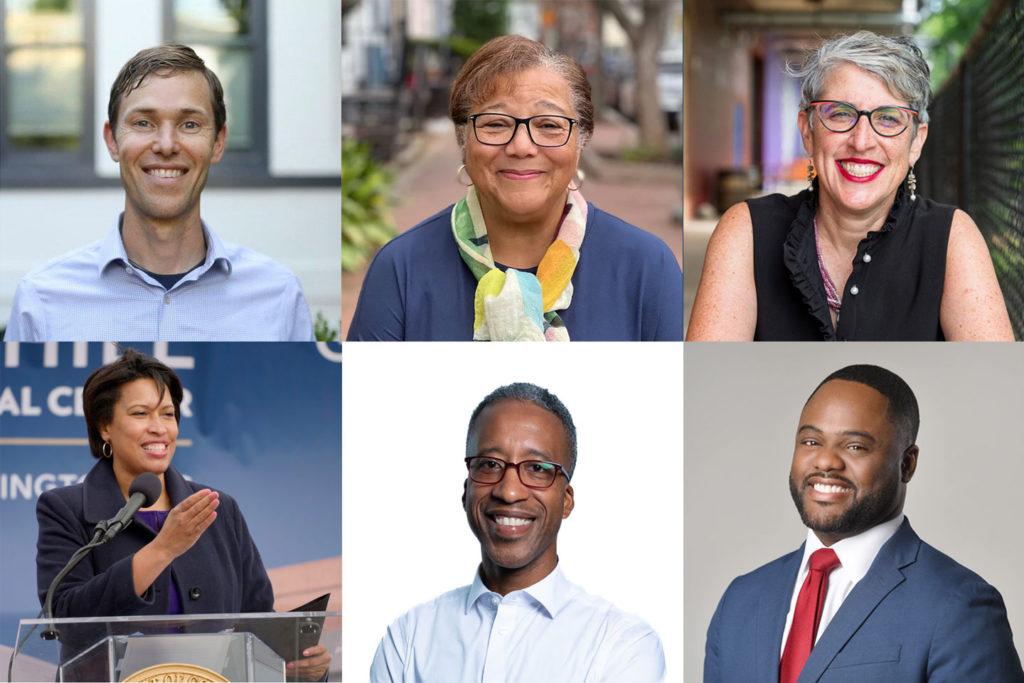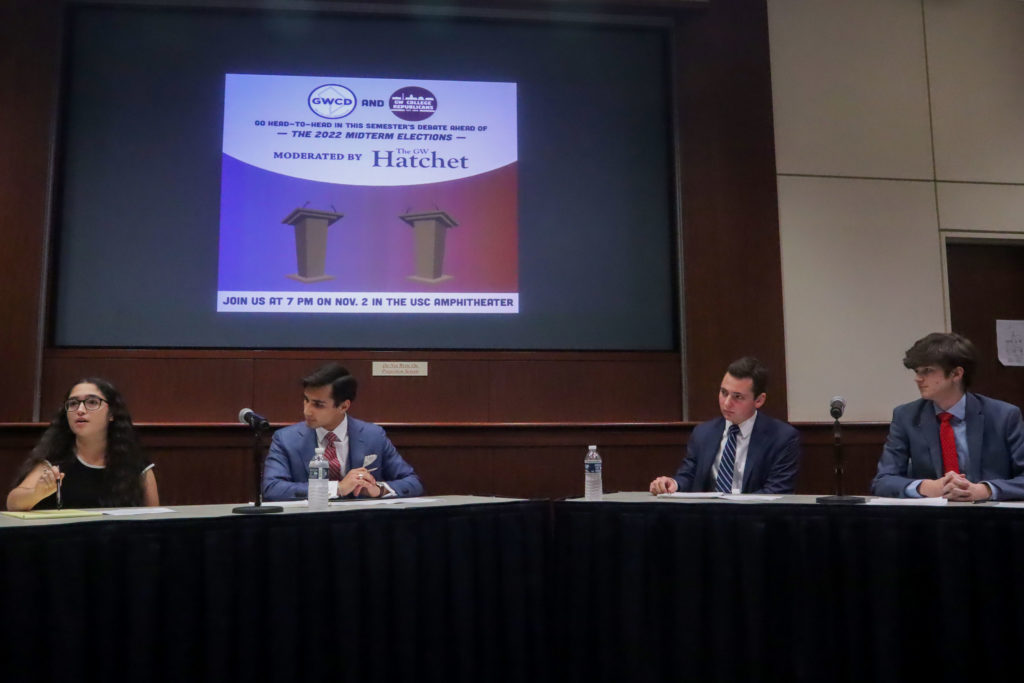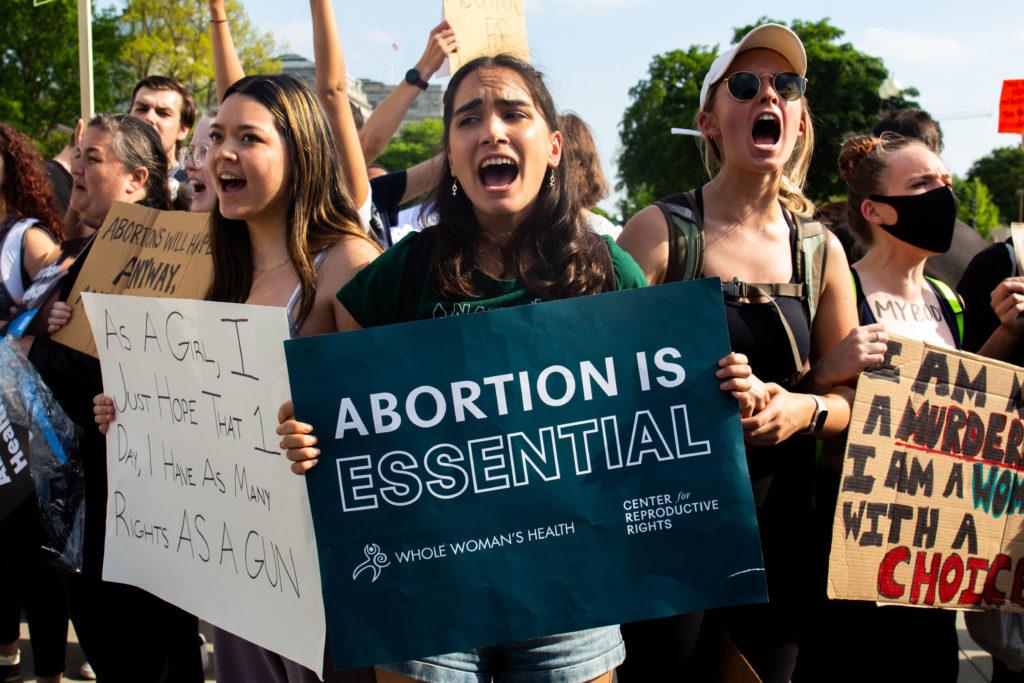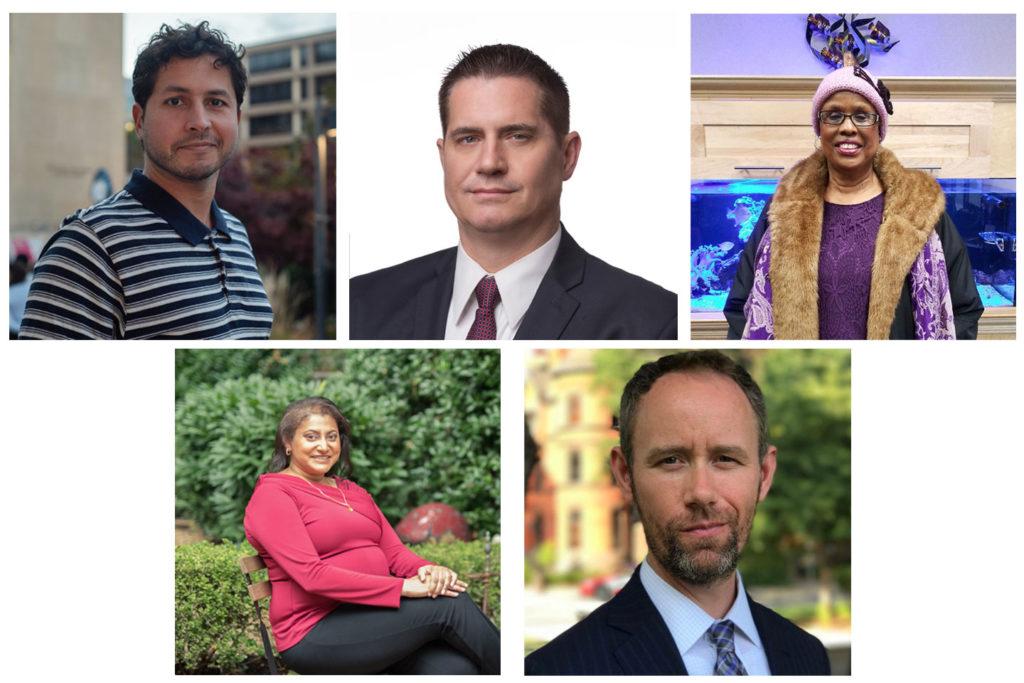Since D.C. voters last went to the polls in 2020, more than 700 residents have died of COVID-19, right-wing extremists rioted at the U.S. Capitol and economic woes have left many Washingtonians reeling from a long two years.
District residents are now headed back to the polling booths, as candidates for city office speak out on abolishing the tipped minimum wage, addressing gun violence and combating housing affordability concerns. On the heels of her primary victory in June, incumbent Mayor Muriel Bowser is expected to win a third term as the District’s top officeholder.
For the D.C. Council, eight candidates are running for two open at-large seats – a race headlined by at-large Council members Anita Bonds and Elissa Silverman, Ward 5 Council member Kenyan McDuffie, pharmaceutical executive Graham McLaughlin and attorney Karim Marshall. D.C. voters will each pick two of the candidates, and the top two vote-getters win seats on the Council.
Here is what you need to know about Bowser and the most significant at-large Council hopefuls:
Mayor: Muriel Bowser
Bowser won a contested Democratic primary in June, holding off progressive challengers led by at-large Council member Robert White to all but clinch her third term as mayor. Bowser has held office since 2015 and touted her distribution of 1.4 million COVID-19 vaccines in D.C. as one of her main accomplishments, along with new revenue-generating developments like supermarkets and office buildings across the District.
During her second term, Bowser was thrust in the national spotlight as she dealt with the onset of the pandemic and the Jan. 6 insurrection at the U.S. Capitol. Bowser has drawn support for policies in 2020 and 2021, like establishing public health emergencies for COVID-19 and renaming 16th Street as Black Lives Matter Plaza, which stood as stark rebukes of former President Donald Trump.
Bowser has signaled that her third term will concentrate on economically and socially recovering from the pandemic and continuing plans to combat homelessness.
She has continued the D.C. government’s 2019 plan to build 36,000 new homes – most of which would be affordable housing – by 2025, a project which reached its halfway point about a year ago. Although expanding affordable housing has sweeping support in the District, more than half of D.C. residents view affordable housing in D.C. as “very difficult” to find, according to The Washington Post.
Progressives have criticized Bowser for her handling of D.C.’s rapid gentrification, particularly her relationship with white private-sector partners, in the past decade and an uptick in violent crime during the pandemic.
Upon her likely reelection, Bowser will become the first D.C. mayor to serve three terms since Marion Barry, who led the District from 1979 to 1991 and a fourth nonconsecutive term from 1995 to 1999.
At-large Council member: Anita Bonds
Democratic D.C. Council member Anita Bonds was the leading candidate in the June primaries, receiving 36 percent of the Democratic vote in a contested field. She is widely expected to win one of the two at-large seats up for grabs. Bonds was first elected in 2012 after working in D.C. politics for four decades, aiding Barry’s first campaign for mayor in 1978.
During her time on the Council, Bonds has received the reputation of a contrarian, often supporting and later voting against progressive proposals like lowering the voting age to 16, extending D.C.’s streetcar route to public housing and requiring large companies to pay higher minimum wages.
The proliferation of affordable housing and the improvement of the District’s public school system are listed on Bonds’ website as her two biggest priorities. The website states Bonds would support increased funding for social programs, touting her support for the Vacancy Increase Amendment Act, which lowered maximum rent increases on high-turnover housing units that lower income individuals often occupy in 2018.
Bonds supports Initiative 82, which would give tipped workers the same minimum wage as other workers in the District. She also backs plans to increase the number of Metropolitan Police Department officers while reducing the number of officers stationed at public schools. At least 11 unions have endorsed Bonds, including the D.C. Firefighters Union, labor unions LIUNA Local 11 and SEIU Local 722.
At-large Council member: Elissa Silverman
Council member Elissa Silverman, an Independent first elected in 2014, is the second incumbent in the at-large Council race. Silverman has emphasized improving access to public housing, tackling D.C. safety issues like gun violence and traffic deaths and cutting taxes on employers to support working families as her priorities for her potential next term.
During her tenure as the chair of the Council’s Committee on Labor and Workforce Development, a position she’s held since 2021, Silverman co-authored the District’s Paid Family Leave Act in 2022, which provides workers up to 12 weeks of paid leave to take care of a relative or recover from an illness.
Silverman has received endorsements from D.C. Attorney General Karl Racine, D.C. Council members Brianne Nadeau and Charles Allen and the Washington Teachers Union.
At-large Council member: Kenyan McDuffie
Kenyan McDuffie, an Independent, has represented Ward 5 on the D.C. Council since 2012, a position that former D.C. State Board of Education president Zachary Parker will likely win. Earlier this year, McDuffie opted to run for D.C. Attorney General instead of his Ward 5 seat, but the D.C. Board of Elections ruled he was ineligible, citing a lack of legal experience necessary for the role.
McDuffie shifted his attention to the at-large Council race, taking stances that have put him at odds with other candidates on the ballot, calling for a new D.C.-based NFL stadium for the Washington Commanders and opposing Initiative 82.
McDuffie has overseen the passage of key criminal justice legislation on the Council, like the Neighborhood Engagement Achieves Results Act in 2016, which directed funding to neighborhood-based solutions for crime. He has also worked to expand the availability of public housing to individuals with a criminal background.
McDuffie has received endorsements from D.C. Council Chair Phil Mendelson, former U.S. Labor Secretary Tom Perez and the Washington Post Editorial Board.
At-large Council member: Graham McLaughlin
Graham McLaughlin, an Independent, is a pharmaceutical executive and one of five nonincumbents to vie for the Council this election. McLaughlin has focused on reforming the D.C. government’s spending accountability, pushing for more oversight and using the District’s revenue to better combat nonaffordable housing and generational wealth.
McLaughlin, like Bonds and Silverman, supports abolishing the tipped minimum wage and increasing the number of MPD officers in D.C. In October, McLaughlin won the endorsement of the Washington Post Editorial Board alongside McDuffie.
At-large Council member: Karim Marshall
Attorney and Independent candidate Karim Marshall has focused his campaign on increasing funding to the District’s public schools and reestablishing a D.C. Council committee focused on education that was disbanded last year.
Marshall is a former D.C. Council staffer with more than a decade of experience in the D.C. government, serving as legislative director of the Department of Energy and Environment until 2016. Marshall’s education priorities landed him the endorsement of the Washington Teachers Union, which also endorsed Silverman.
At-large Council member: Trailing candidates
Businessman Fred Hill and Republican Giuseppe Niosi, who had more conservative platforms, did not receive any major endorsements from D.C. figures. David Schwartzman, a progressive candidate, received the endorsement of former presidential candidate Jill Stein.





